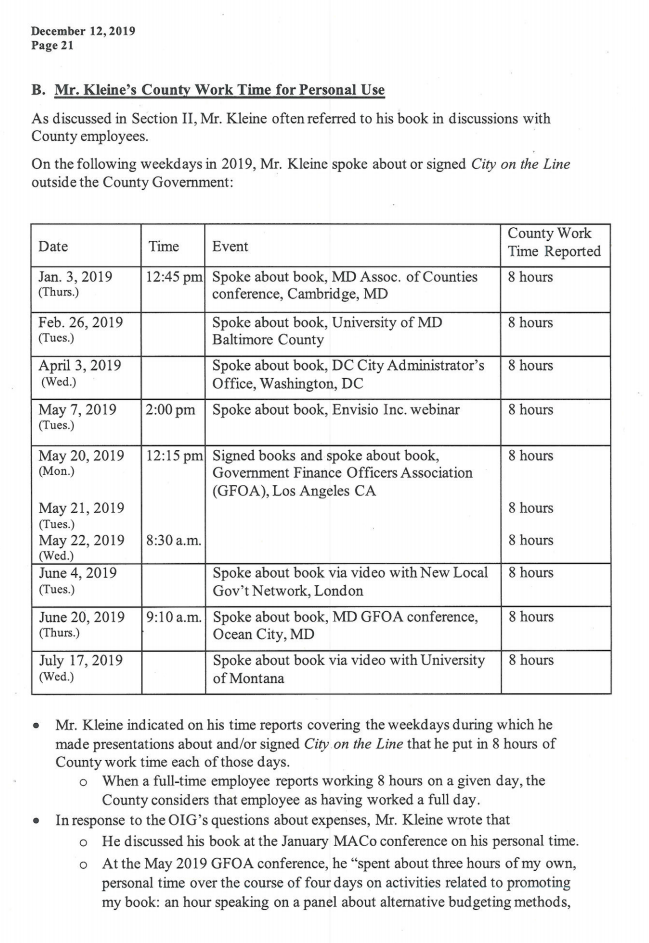By Adam Pagnucco.
When the county council met yesterday to consider the case of admitted ethics violator and Chief Administrative Officer (CAO) Andrew Kleine, one word alone can describe what happened: Eruption. Rockville was covered by a black cloud of ash and lava sprayed through the streets as the council held very little back. Montgomery County Government has never seen anything quite like it.
The basics are simple: last year, executive branch county employees (all of whom work under Kleine) complained to the ethics commission about his book marketing and his relationship with contractors with whom he had done private business and then had gone on to help obtain county contracts. After an investigation by the county’s inspector general, Kleine proposed a “cure” which involved the payment of $5,000 and his abstention from outside employment. The ethics commission accepted the cure and the county executive has allowed Kleine to remain as CAO. Seventh State has previously published columns on the issue on July 2, July 7, July 9 and July 27.
Kleine was not present at the council’s meeting, leaving ethics commission chair Rahul Goel and ethics commission staff director Robert Cobb to brief the council on Kleine’s ethics case. Before elaborating on the situation with Kleine, Goel and Cobb suggested a need for mandatory ethics training for all county employees, including elected officials. No one disagreed with that. But the council did not buy that ethics training alone would have prevented Kleine’s actions. What followed was a remarkable and unprecedented display by the council members in which some walked right up to the line of calling for the CAO’s resignation without actually crossing it. Consider these quotes from the briefing.
*****
Council Member Nancy Navarro
Training is important but how would that have avoided this situation? And it’s one thing for an employee to have done something like this but when it’s the Chief Administrative Officer, that raises for me some concerns because the employees, the county government employees obviously are under the Chief Administrative Officer and it is very difficult with a straight face to say to our employees “you’re going to have to go to mandatory training” when the Chief Administrative Officer himself didn’t seem to understand the basics of ethics and conflicts of interest…
I personally still have some concerns regarding the ability of Mr. Kleine to be the Chief Administrative Officer of our county government when there was such a lapse in judgment regarding something like this.

Council Member Gabe Albornoz
I’m troubled that Mr. Kleine was not put on administrative leave during the course of the investigation and continued in his role as the head of procurement for our entire county through this investigation. I’m concerned that the county executive has not reached out to my colleagues and I to express how his administration has taken this matter extraordinarily seriously, how there has been, I believe, a statement from the county executive but not much more than that in terms of his comments on this particular matter.
Because the ripple effect of a situation like this is profound. What do we say to department heads who are also found guilty of similar violations? That you get one strike? You get a pass the first time around and yes, there is a cure, but the cure for the payment of $5,000 and the retainment of employment is significant in light of what we have seen. And I appreciate those recommendations and I also appreciate the recommendation of additional training.
But the broader question here is trust. And I worked in an executive branch for twelve years and know how important that trust is among colleagues. And I don’t believe enough has been done beyond this cure to repair the damage from the messaging that this sends to all the county government, that this sends to people that deal in their business with county government. And I don’t think quite frankly that this matter has been taken seriously enough by this administration. And that’s a concern.
Council Member Hans Riemer
This whole incident reinforces a concern that I have had about – and I think many people in the county government have had about the chief administrator’s work. The county executive has allowed him to really apply his personal business theory, his personal business practice, “turn the curve,” to his management of the county government. The county executive has required all of our departments to participate in something that really often feels like a demonstration project for a consulting practice. And it often feels like it substitutes jargon for real management initiatives. And that has been weighing on me for a lot of time. And I think that this report just raises some real questions about the continuing of the consulting business and really whether the intended – whether the chief administrator’s success is the county’s success. And I think that that is weighing on a lot of people and department heads and managers. And I think we do have an issue. We need to restore the confidence of this county government in the leadership of the executive branch.

Council Member Craig Rice
At the end of the day, this falls on the county executive. The county executive wants to continue to have the number two person in charge be a person who has committed serious ethics violations, that’s a choice he’s going to have to justify, that’s a choice that he’s going to have to stand up and say this is why he feels as though it’s comfortable to have this person still in charge in a leadership position.
Council Member Andrew Friedson
Public trust is the only currency that we have in public life. It’s all we have in terms of our ability to govern, and to me, this speaks directly to public trust. And it’s why I share many of the comments of colleagues of how disturbed and disappointed I am by the contents of the ethics report because that’s what this speaks to. And it’s not a member of the county government, it is not some county employee, it is the top county employee, the person who is in charge of running the government. And I speak similarly to comments that were made about – the comments about training. This is not a training issue. Let’s not obscure what happened here. This is specifically a clear violation of ethics and of public trust. That’s what it is. It is a massive, massive failure of judgment in the highest position in county government…
When we talk about this as being a cure, it’s kind of a euphemism. What this really is effectively is a plea agreement.

*****
Volcanic eruptions can be hard to survive due to their pollution of the atmosphere, the danger of lava flows and the potential for subsequent discharges. In this case, the repeat discharge potential is real with multiple council members asking whether Kleine received special treatment (a subject for another time!) and requesting more information. Lava, like water, can drip drip drip.
With the council’s eruption threatening to bury the executive branch in a blanket of burning ash, the big question now is: why has the county executive allowed Kleine to stay? And will that continue?



